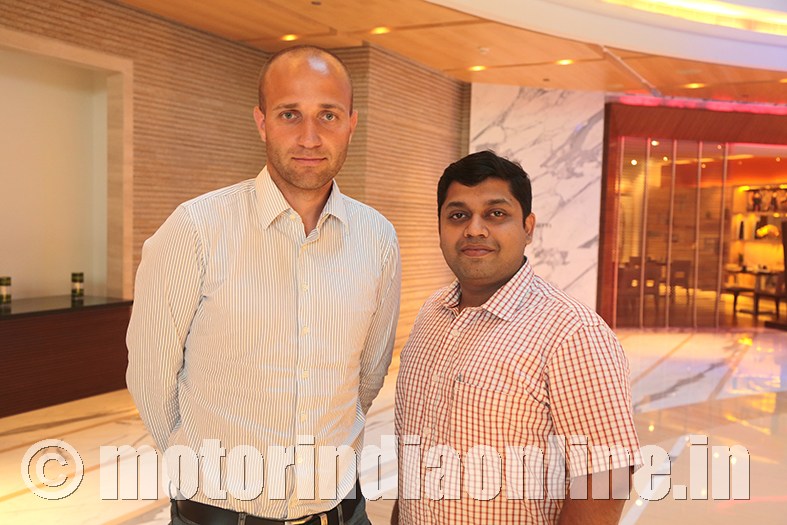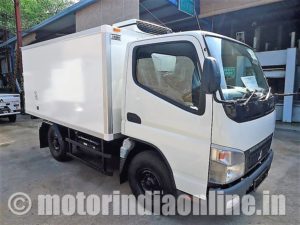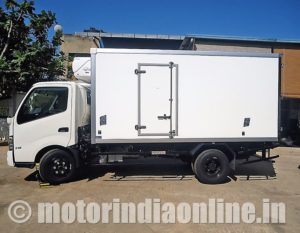Customers delighted with product quality, tech support
Lamilux is a world leader in providing light-weight glassfiber-reinforced plastic (GRP) / fibre-reinforced plastic (FRP) solutions for a wide range of applications. Since 2009, the German firm has been offering solutions for customers in the Indian market for sandwich panel construction for truck bodies and many other applications through its subsidiary Lamilux India Pvt. Ltd. Having played an integral role in helping develop the country’s cold chain in close association with the National Centre for Cold Chain Development (NCCD), Lamilux remains committed to the Indian market with its renewed thrust on market expansion and deeper penetration.

As the FRP expert gazes into the next phase of growth for both its Indian business and the country’s cold chain sector, we spoke to Mr. Oliver Liebsch, Lamilux India’s new Managing Director, and Mr. Rohan Bellikatti, the company’s newly-appointed Regional Technical Sales Manager – South India and Sri Lanka.
Lamilux was one of the early entrants into the Indian market with high quality and reliable FRP solutions. Over the last eight years, the company has been extremely patient, but at the same time quite proactive in spreading awareness of the advantages of FRP over traditional materials like stainless steel and aluminium. While breaking fixed mindsets is a difficult task anywhere, more so in India, Lamilux has managed to hand-hold a large set of customers into the FRP realm, helping them get acquainted with better lifecycle costs rather than focusing on the initial product acquisition cost.
Says Mr. Liebsch: “Most of the well-known and successful reefer builders are using our material. This was evident at last year’s India Cold Chain Show where all the reefer boxes were built using our FRP. Our customers have realized FRP has big advantages for the cold chain industry, which is very good news for us and the industry.” Lamilux will be participating in this year’s India Cold Chain Show as well, scheduled to be held in Mumbai in December.
Today, Lamilux has reached a level of maturity in the Indian market where it has customers who buy its material on a regular basis, while there are others who buy occasionally. The company is working on reaching out to all possible stakeholders to ensure the FRP revolution grows and grows fast. “We will continue to try and convince people by showing them the benefits of FRP. Our volumes are increasing every year with the reefer body manufacturers, with the Government support playing a vital role in taking things in the right direction. We are in talks with the OEMs and will step up our discussions with logistics companies and fleet owners as well so that everyone knows us and considers switching over to FRP”, adds Mr. Bellikatti.
Complete support
With an alarming close to 30 per cent of food getting wasted in India, the Government has started offering subsidies to stakeholders in the cold chain sector to try and bring down wastage. Since cold chain transport is a major bottleneck in the existing cold chain infrastructure in the country, attractive subsidies are being offered towards reefer container building to help bridge the supply-demand gap.
In such an environment where improving the quality, reliability and the overall efficiency of cold chain transport takes centre-stage, composite material suppliers like Lamilux feel they can make a difference. “We have a solution which can help overcome all the existing difficulties in cold chain transport. We can change the operational model completely by offering light weight vehicle, more payload, additional space, excellent insulation and perfect temperature maintenance, so that the food products are in ambient temperature for the required time and thereby remain in good condition. The overall efficiency of the vehicle increases and therefore benefits the customers in a big way”, explains Mr. Liebsch.
Mr. Bellikatti is quick to add: “FRP offers a complete package of benefits. Our material has low corrosion and is easy to protect. We do not just sell our material but also provide technical support which our customers appreciate very much and find a lot of value in; our vast experience in application engineering enables us to offer a complete solution to our customers”.
So, where does Lamilux get its material from? The composites are made in Germany and shipped to the sub-continent. But wouldn’t that take a long time? Not really, especially when you have a warehouse located in Bhiwandi near Mumbai where the material goes straight to once they arrive at Mumbai port. So, in addition to offering the product along with technical support, Lamilux ensures it is quick to respond to any kind of issue at its customers’ end.
“We are working on getting closer to our customers. We have relocated our warehouse from Delhi to Bhiwandi. The new warehouse is almost 300 sq. m. is size and can store nearly 20,000 sq. m. of material which would suffice for building reefer containers on nearly 400 trucks. All our customers would benefit with such an arrangement. If any of our customers has a problem, we immediately travel to their site and ensure things are back on track as smoothly and quickly as possible. Our aim is to the deliver the best quality product and back it up with the most reliable service assistance so that our customers are happy”, explains the Regional Technical Sales Manager.
The road ahead
While truck reefer bodies would continue to remain Lamilux’ core focus area in the Indian market, the company is also looking at other applications such as cold housing and cold stores. Within the transport segment, it has already started working with a bus body builder on deploying its material in different parts of the bus body.
The MD shares: “We are in discussion with a leading bus body builder in India and have made a prototype of a bus roof using our material. There are a huge number of composite buses running globally, especially in the intra-city segment, and we have very good experience in working with leading bus manufacturers like Scania, MAN and EvoBus (Daimler) in different parts of the world. In India, the roads are different; we have BS-IV emission norms across the country and will have BS-VI in three years’ time. With light-weighting likely to be a major focus area for the bus segment, our material can help reduce the weight of the bus roof by up to 60 per cent, resulting in significant fuel savings. The concept is new to the Indian bus industry and so will take time, but we are quite positive.”
The future does look bright for Lamilux’ business in India. The company has achieved market leadership status globally in the field of composites and is keen on making its first-mover advantage count in the Indian market. Given the market is poised to grow well in the coming years, Lamilux is trying to do even better in the coming days.
“India is a very important market for us. We have a good set-up here and are confident of having a good future. The Indian reefer market is growing at nearly 30 per cent and a couple of years down the line the requirement would be double what it is today. Things are looking very positive at the moment and we are looking forward for the future. For India the growth we expect in the next years could be around 30 per cent, if not more”, he signs off.

